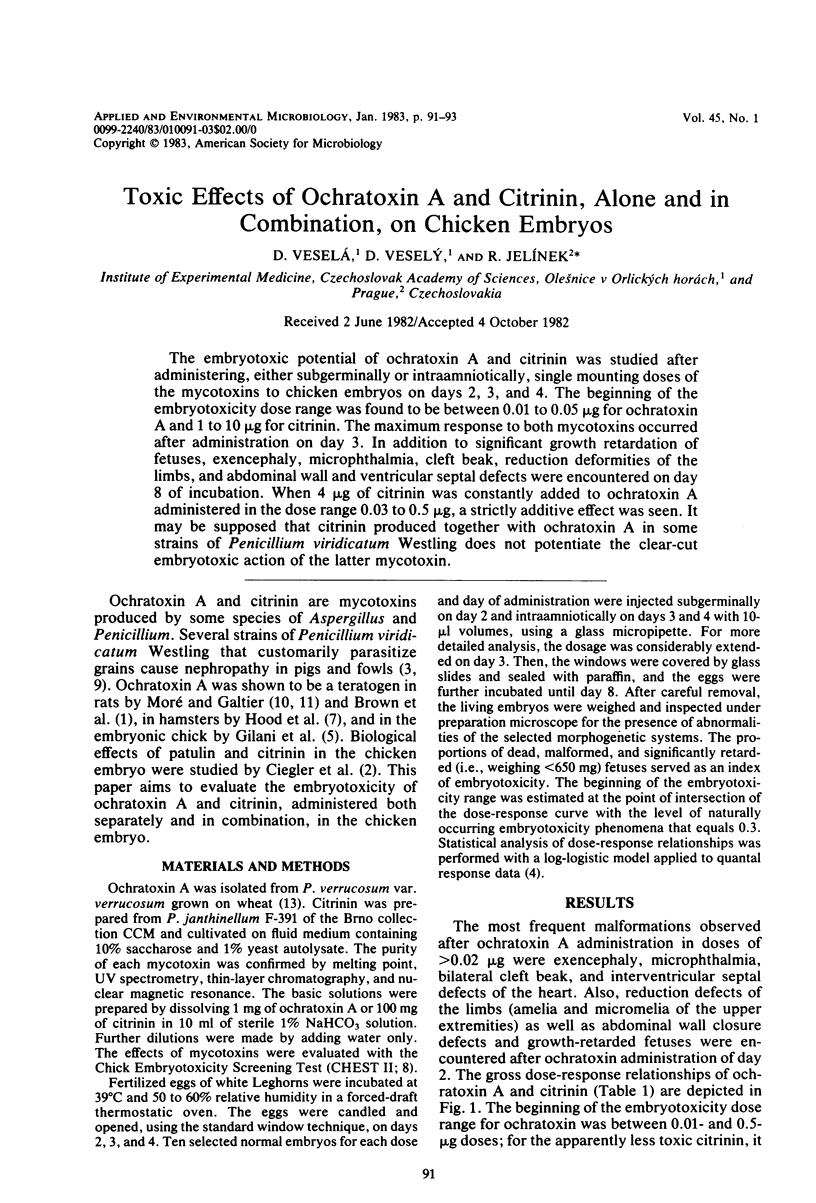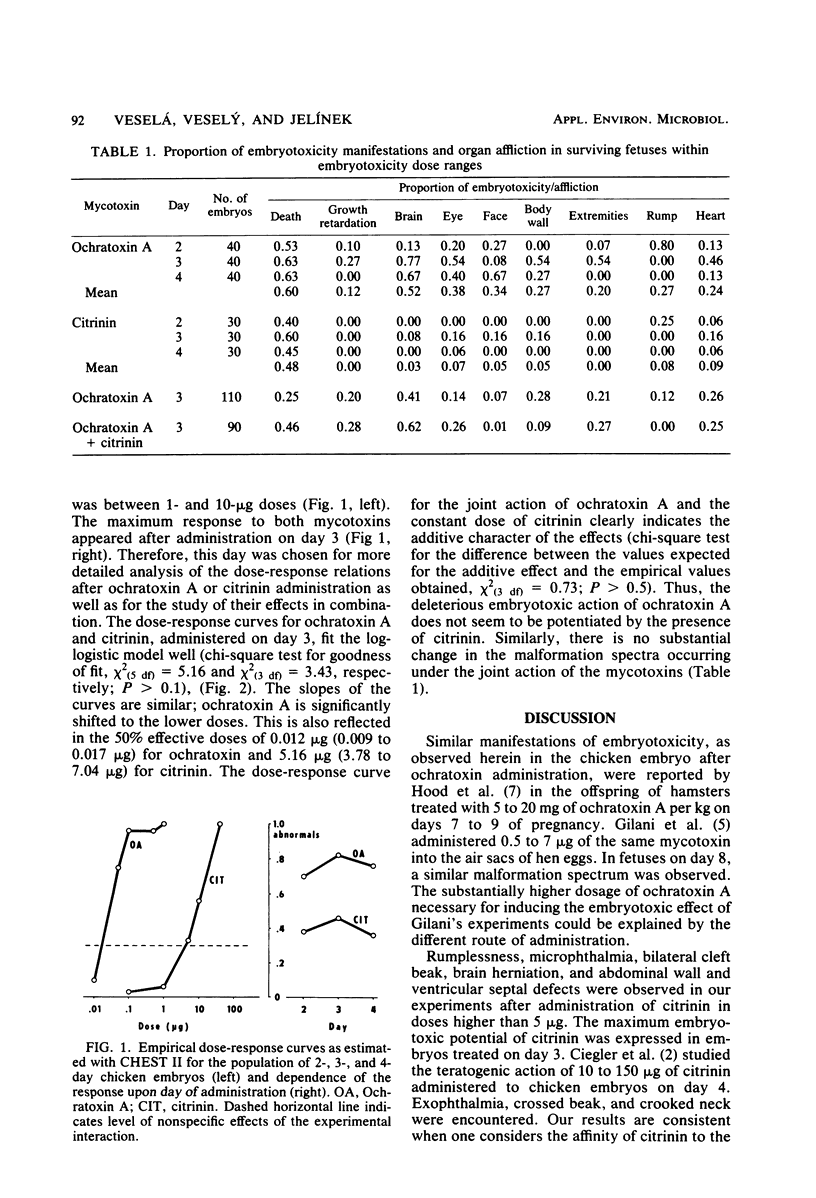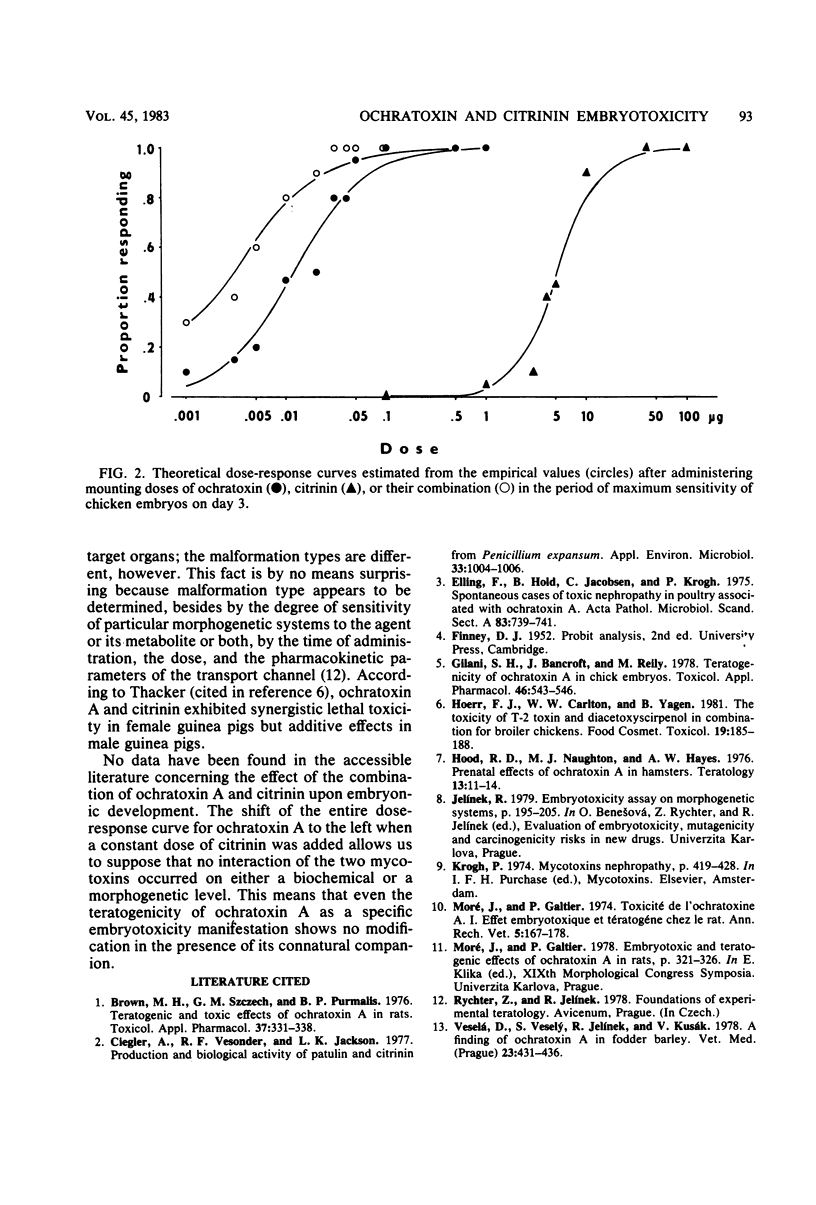Abstract
The embryotoxic potential of ochratoxin A and citrinin was studied after administering, either subgerminally or intraamniotically, single mounting doses of the mycotoxins to chicken embryos on days 2, 3, and 4. The beginning of the embryotoxicity dose range was found to be between 0.01 to 0.05 microgram for ochratoxin A and 1 to 10 micrograms for citrinin. The maximum response to both mycotoxins occurred after administration on day 3. In addition to significant growth retardation of fetuses, exencephaly, microphthalmia, cleft beak, reduction deformities of the limbs, and abdominal wall and ventricular septal defects were encountered on day 8 of incubation. When 4 micrograms of citrinin was constantly added to ochratoxin A administered in the dose range of 0.03 to 0.5 microgram, a strictly additive effect was seen. It may be supposed that citrinin produced together with ochratoxin A in some strains of Penicillium viridicatum Westling does not potentiate the clear-cut embryotoxic action of the latter mycotoxin.
Full text
PDF


Selected References
These references are in PubMed. This may not be the complete list of references from this article.
- Brown M. H., Szczech G. M., Purmalis B. P. Teratogenic and toxic effects of ochratoxin A in rats. Toxicol Appl Pharmacol. 1976 Aug;37(2):331–338. doi: 10.1016/0041-008x(76)90096-x. [DOI] [PubMed] [Google Scholar]
- Ciegler A., Vesonder R. F., Jackson L. K. Produciton and biological activity of patulin and citrinin from Penicillium expansum. Appl Environ Microbiol. 1977 Apr;33(4):1004–1006. doi: 10.1128/aem.33.4.1004-1006.1977. [DOI] [PMC free article] [PubMed] [Google Scholar]
- Elling F., Hald B., Jacobsen C., Krogh P. Spontaneous toxic nephropathy in poultry associated with ochratoxin A. Acta Pathol Microbiol Scand A. 1975 Nov;83(6):739–741. doi: 10.1111/j.1699-0463.1975.tb01406.x. [DOI] [PubMed] [Google Scholar]
- Gilani S. H., Bancroft J., Reily M. Teratogenicity of ochratoxin A in chick embryos. Toxicol Appl Pharmacol. 1978 Nov;46(2):543–546. doi: 10.1016/0041-008x(78)90099-6. [DOI] [PubMed] [Google Scholar]
- Hoerr F. J., Carlton W. W., Yagen B. The toxicity of T-2 toxin and diacetoxyscirpenol in combination for broiler chickens. Food Cosmet Toxicol. 1981 Apr;19(2):185–188. doi: 10.1016/0015-6264(81)90356-4. [DOI] [PubMed] [Google Scholar]
- Hood R. D., Naughton M. J., Hayes A. W. Prenatal effects of Ochratoxin A in hamsters. Teratology. 1976 Feb;13(1):11–14. doi: 10.1002/tera.1420130103. [DOI] [PubMed] [Google Scholar]
- Khan M. R., Blain J. A., Patterson J. D. Extracellular Proteases of Mucor pusillus. Appl Environ Microbiol. 1979 Apr;37(4):719–724. doi: 10.1128/aem.37.4.719-724.1979. [DOI] [PMC free article] [PubMed] [Google Scholar]
- LOWRY O. H., ROSEBROUGH N. J., FARR A. L., RANDALL R. J. Protein measurement with the Folin phenol reagent. J Biol Chem. 1951 Nov;193(1):265–275. [PubMed] [Google Scholar]
- MCDONALD C. E., CHEN L. L. THE LOWRY MODIFICATION OF THE FOLIN REAGENT FOR DETERMINATION OF PROTEINASE ACTIVITY. Anal Biochem. 1965 Jan;10:175–177. doi: 10.1016/0003-2697(65)90255-1. [DOI] [PubMed] [Google Scholar]
- Somkuti G. A., Babel F. J. Conditions influencing the synthesis of acid protease by Mucor pusillus Lindt. Appl Microbiol. 1967 Nov;15(6):1309–1312. doi: 10.1128/am.15.6.1309-1312.1967. [DOI] [PMC free article] [PubMed] [Google Scholar]
- Somkuti G. A., Babel F. J. Purification and properties of Mucor pusillus acid protease. J Bacteriol. 1968 Apr;95(4):1407–1414. doi: 10.1128/jb.95.4.1407-1414.1968. [DOI] [PMC free article] [PubMed] [Google Scholar]
- Veselá D., Veselý D., Jelínek S., Kusák V. Nález ochratoxinu A v krmném jecmeni. Vet Med (Praha) 1978 Jul;23(7):431–436. [PubMed] [Google Scholar]



